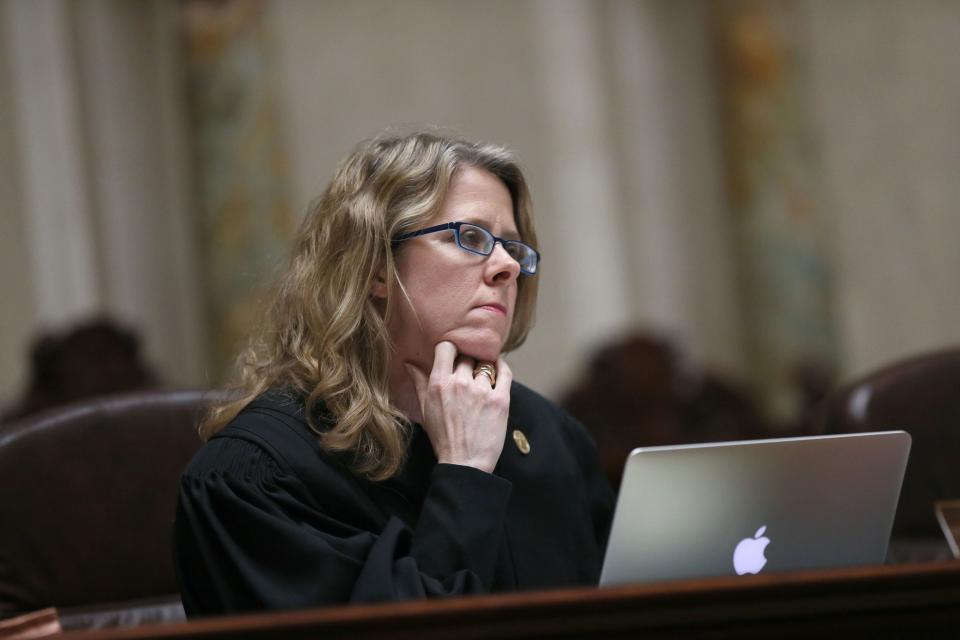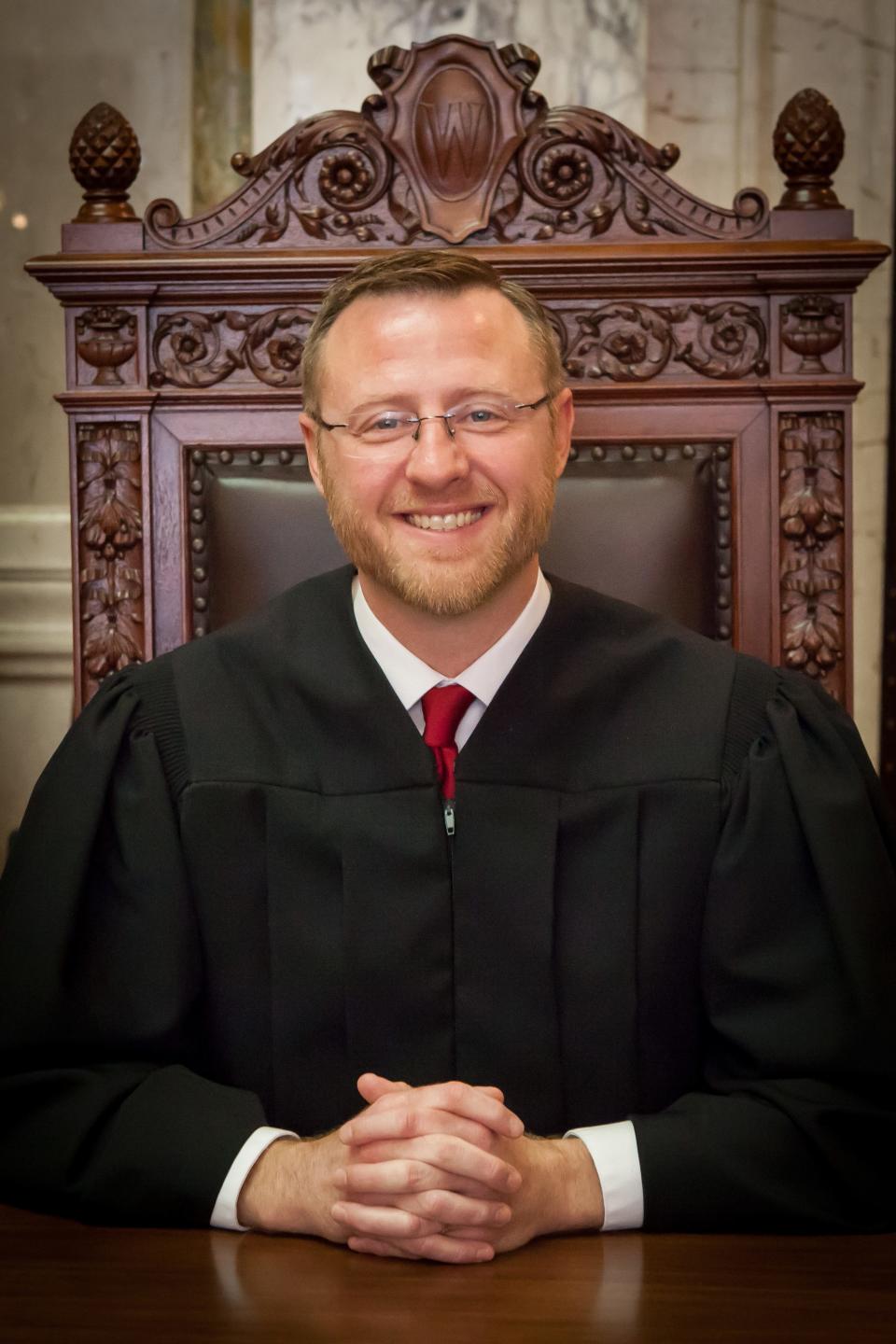Wisconsin Supreme Court rules absentee ballot drop boxes are illegal
MADISON - Voters casting absentee ballots this fall for the highest state offices won't be able to return their ballots in upcoming elections by using drop boxes following a ruling Friday by the Wisconsin Supreme Court's conservative majority.
The 4-3 ruling, coming four weeks before statewide primaries Aug. 9, is a win for Republicans who now oppose the longstanding use of ballot drop boxes after their use proliferated during the coronavirus pandemic and was heavily criticized by former President Donald Trump, who alleged with no evidence that absentee voting was rife with fraud and led to his reelection loss in 2020.
Writing for the majority, Justice Rebecca Bradley said state law does not permit drop boxes anywhere other than election clerk offices and only state lawmakers may make new policy stating otherwise — not the Wisconsin Elections Commission, which issued guidance to clerks allowing them.
"WEC's staff may have been trying to make voting as easy as possible during the pandemic, but whatever their motivations, WEC must follow Wisconsin statutes. Good intentions never override the law," Bradley wrote.

Hundreds of absentee drop boxes were installed across the state in 2020 to help voters cast their ballots without interacting with other people. More than 40% of all votes cast that year were through absentee ballots.
Republicans began scrutinizing their use as Trump launched a baseless campaign against absentee voting ahead of his election loss that continues today. GOP candidates for governor and U.S. Senate who have proposed to overhaul the state's election system in the wake of Trump's false claims, lauded the Friday ruling.
"Regardless of political affiliation, the goal should be to restore confidence in the integrity of our election system. This decision is a big step in the right direction," U.S. Sen. Ron Johnson, a Republican from Oshkosh who is up for reelection this year, said in a statement.
The majority opinion of the 114-page ruling quotes William Shakespeare and hip-hop artist Kanye West to make the case that the state elections commission overstepped its bounds.
"No one man should have all that power," Bradley wrote, quoting West's lead single for his 2010 album "My Beautiful Dark Twisted Fantasy."
Bradley also suggests the ruling will prevent Wisconsin elections from becoming the rigged contests found in totalitarian regimes like Iraq, Cuba, Syria and North Korea.
But critics of the 2020 election have not put forward any evidence showing significant fraud manipulated the Wisconsin contests that year.
In a separate concurring opinion, Justice Brian Hagedorn said the court's role was not to determine policy or bolster confidence in voting. He said the case "was not about ensuring everyone who wants to vote can, nor should we be concerned with making absentee voting more convenient and secure."
"Those are policy concerns, and where the law does not speak, they are the business of the other branches, not the judicial branch," he wrote.
"Our obligation is to follow the law, which may mean the policy result is undesirable or unpopular. Even so, we must follow the law anyway. To the extent the citizens of Wisconsin wish the law were different, the main remedy is to vote and persuade elected officials to enact different laws. This is the hard work of democracy."

The decision ensures, for now, that Wisconsin voters with significant physical disabilities may have a friend or family member drop their absentee ballot in a mailbox for them, but such voters may no longer be able to have others return their absentee ballots to a local clerk's office in person.
Such help may be sought in only limited cases, such as a hospitalized voter, under the ruling. That means spouses may not return absentee ballots in person for each other, for example.
Barbara Beckert, director of Disability Rights Wisconsin's office in Milwaukee, condemned the ruling's timing during an election, noting that many are already preparing to vote absentee.
She urged election officials to send clear guidelines to local clerks as soon as possible so that voters with disabilities can arrange for accommodations as soon as possible.
Beckert added that she believes access to ballot delivery, or having a ballot delivered to a clerk or polling place, is still protected under the federal Americans with Disabilities Act.
“This case just reminds us that we still have quite a ways to go to realize the promise of the ADA, which includes having equitable access to voting," she said.
Justice Ann Walsh Bradley, writing for the minority, said the majority's ruling "blithely and erroneously seeks to sow distrust in the administration of our elections and through its faulty analysis erects yet another barrier for voters to exercise this 'sacred right.'"
"Although it pays lip service to the import of the right to vote, the majority/lead opinion has the practical effect of making it more difficult to exercise it. Such a result, although lamentable, is not a surprise from this court," Bradley wrote. "It has seemingly taken the opportunity to make it harder to vote or to inject confusion into the process whenever it has been presented with the opportunity."
The underlying dispute over absentee voting policies began last year when the conservative Wisconsin Institute for Law & Liberty filed the lawsuit on behalf of two suburban Milwaukee men.
"While the question of whether an agent may mail an absentee ballot remains open, Wisconsin voters can have confidence that state law, not guidance from the Wisconsin Elections Commission, has the final word on how Wisconsin elections are conducted,” Rick Esenberg, president and chief counsel of WILL, said in a statement.
More: Lawsuit seeks to end the use of absentee ballot drop boxes in Wisconsin
Waukesha County Circuit Judge Michael Bohren ruled in their favor in January and ordered the state elections commission to revoke advice it issued in 2020. He determined that state law didn’t allow the use of unstaffed ballot drop boxes and didn’t allow voters to give their completed absentee ballots to someone else to return for them.
Subscribe to our On Wisconsin Politics newsletter for the week's political news explained.
The state commission appealed and the case quickly made its way to the state Supreme Court. The justices blocked Bohren’s order for the February primary but let it go into effect for the April election for Milwaukee mayor, appeals court judge and other offices around the state.
Disputes soon escalated over what the court's action meant.
Disabled voters said the ways some local officials were interpreting the initial decision was preventing them from voting. They noted those who are paralyzed or have other disabilities can't place their absentee ballots in the mail or personally hand them in.
Poll workers typically visit nursing homes to assist residents in voting. Clerks allow curbside voting for people who can’t get out of their cars. In some cases, postal workers will pick up and deliver mail to someone's door instead of a mailbox at the end of a driveway if the recipient has a medical condition.
Those policies help some voters but not everyone.
The ruling delivers critical blows to Democrats, barring the use of drop boxes where they are most popular: the liberal centers of Milwaukee and Madison.
In a statement, Assembly Speaker Robin Vos said the next "step" following the ruling "has to be electing a new governor who will sign additional election reforms."
Democratic incumbent Gov. Tony Evers, who has made voting issues central to his re-election campaign this year, said the ruling is "another in a long line of Wisconsin Republicans' successes to make it harder for Wisconsinites to exercise their right to vote."
“At the very heart of our democracy is the fundamental right for every eligible voter to be able to cast their ballot — a right that’s far too important to be left to the whims of any politician or political party," Evers said in a statement. "We should be working every day to protect that fundamental right by making it as easy as possible for every eligible voter to vote in Wisconsin."
Isaac Yu of the Milwaukee Journal Sentinel contributed to this report.
You can find out who your legislators are and how to contact them here.
Contact Molly Beck at molly.beck@jrn.com. Follow her on Twitter at @MollyBeck.
Our subscribers make this reporting possible. Please consider supporting local journalism by subscribing to the Journal Sentinel at jsonline.com/deal.
DOWNLOAD THE APP: Get the latest news, sports and more
This article originally appeared on Milwaukee Journal Sentinel: Wisconsin Supreme Court rules absentee ballot dropboxes are illegal

